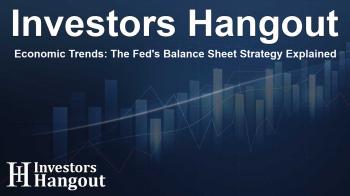Economic Trends: The Fed's Balance Sheet Strategy Explained

Understanding the Federal Reserve's Balance Sheet Strategy
The Federal Reserve's recent decision to pause its long-running balance sheet reduction has sparked discussions among analysts regarding potential impacts on financial markets. Many experts believe this change may influence financial stability more significantly than the current interest rates in the upcoming months.
The Influence of AI Optimism on Market Sentiment
The Shift in Market Dynamics
The liquidity shift could momentarily dampen market sentiment; however, many analysts anticipate a gradual recovery aligned with the banking system’s growth as asset purchases recommence. Recent commentary from economic experts suggests an atmosphere of cautious optimism driven largely by advancements in technology, particularly in artificial intelligence.
Analysts' Insights on Market Reactions
Experts at Wolfe Research conveyed that the decision to halt Treasury Securities' reduction indicates a changing liquidity environment. They emphasized that reserves might contract in the near future, presenting a complex landscape for investors.
The Impact of Interest Rate Policies
Despite the anticipated halt in the balance sheet reduction, the Fed recently cut its benchmark interest rate, signaling a shift in its approach. This decision, a strategic move after a series of rate increases, is expected to usher in a new era of economic management.
Uncertain Future: The Fed Chair's Caution
Fed Chair Jerome Powell's comments regarding the uncertainty surrounding potential rate cuts further complicate predictions. He noted that any plans for a rate cut in December are not guaranteed, a statement that intensified market reactions and expectations.
Policy Critiques and Economic Context
Criticism has emerged regarding the information provided to the Federal Reserve for its decision-making processes. Political figures have expressed concerns over the Fed potentially being uninformed due to insufficient economic data. This context adds an extra layer of scrutiny to the Fed's strategies and decisions moving forward.
Frequently Asked Questions
What is the Federal Reserve's balance sheet?
The Federal Reserve's balance sheet represents its financial standing, detailing assets and liabilities. It reflects monetary policy actions, including asset purchases and sales.
How does the balance sheet affect financial markets?
The balance sheet impacts liquidity in the financial system, which can influence market sentiment and investment patterns. Analysts argue that changes to it can affect market dynamics significantly.
Why is AI optimism important in this context?
Artificial intelligence is seen as a driver of future growth, and its potential to revolutionize various sectors has led to increased investor confidence, impacting market trends.
What did Jerome Powell imply about future interest rate cuts?
Jerome Powell indicated that while discussions of rate cuts are ongoing, any decision is uncertain, and relying on historical patterns alone may not suffice for prediction.
How do political critiques impact the Federal Reserve?
Political critiques highlight concerns about the transparency and accuracy of the data influencing the Fed's decisions, which could potentially affect its credibility and decision-making processes.
About The Author
Contact Riley Hayes privately here. Or send an email with ATTN: Riley Hayes as the subject to contact@investorshangout.com.
About Investors Hangout
Investors Hangout is a leading online stock forum for financial discussion and learning, offering a wide range of free tools and resources. It draws in traders of all levels, who exchange market knowledge, investigate trading tactics, and keep an eye on industry developments in real time. Featuring financial articles, stock message boards, quotes, charts, company profiles, and live news updates. Through cooperative learning and a wealth of informational resources, it helps users from novices creating their first portfolios to experts honing their techniques. Join Investors Hangout today: https://investorshangout.com/
The content of this article is based on factual, publicly available information and does not represent legal, financial, or investment advice. Investors Hangout does not offer financial advice, and the author is not a licensed financial advisor. Consult a qualified advisor before making any financial or investment decisions based on this article. This article should not be considered advice to purchase, sell, or hold any securities or other investments. If any of the material provided here is inaccurate, please contact us for corrections.

